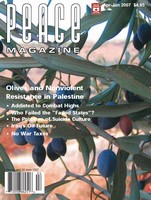
Peace Magazine Apr-Jun 2007, page 31. Some rights reserved.
Search for other articles by PMag staff here
On February 27, the International Criminal Court Prosecutor Luis Moreno-Ocampo presented evidence that two men had jointly committed crimes against the civilian population of Darfur.
Based on evidence collected during a 20-minth period, the prosecution accused Ahmad Harun, the former Minister of Interior for the Government of Sudan, and Ali Kushayb, a Janjaweed militia leader, of responsibility for 51 counts of crimes against humanity and war crimes. The evidence shows that Harun incited the Janjaweed to attack civilians. Charges will be laid against other ringleaders of these atrocities in the months ahead.
The Prosecution stated that it had been necessary to conduct interviews with victims and witnesses outside Darfur, since it was not possible to protect them inside the region. They collected nearly 100 statements and accepted other documents collected by the United Nations Commission of Inquiry.
The ICC investigates and prosecutes only where national courts have failed. In this case, Khartoum officials have even threatened to kill any ICC officers who try to arrest the accused. With political will, however, other countries will be able to assist in executing these warrants.
On March 12, the UN Human Rights Mission to Darfur announced its demands, which included the following:
It remains uncertain whether this UN Human Rights Council will act more vigorously than the ineffectual Commission that it replaced several months ago.
An independent research and advocacy group has recently been launched in Ottawa: the Rideau Institute on International Affairs. It provides research, analysis, and policy commentary to decision makers, opinion leaders, and the public. Areas of current work include human rights, defence and security, space security, sovereignty and democracy, and nuclear disarmament. Other areas will be developed.
The new institute's president and founder is Steven Staples, previously director of programs for the Polaris Institute and, before that, campaign coordinator for the Council of Canadians and for End the Arms Race. Staples is known for his work on international defence, disarmament, and trade issues. His recent book, Missile Defence: Round One, described the citizen-based campaign that persuaded the Martin government not to join the US ballistic missile defence program.
The Rideau Institute's program director is Anthony Salloum, former legislative and communications assistant to Alexa McDonough, the NDP's current foreign affairs and international development critic.
The institute is working with another new organization, Right On Canada, which deliberately chooses not to acquire charitable status, for it intends to organize campaigns on issues pertaining to human rights and to lobby the government. Right On Canada is headed by Vancouver-based Kathleen Ruff.
Web pages for the two organizations are: www:rideauinstitute.ca and rightoncanada.ca
Investigative journalist Seymour Hersh published a surprising item om the March 5 issue of The New Yorker exploring the new US Middle East strategy. After interviewing numerous people in Washington and the Middle East, including Nasrallah, the head of Hezbollah, he reports that the Bush administration has been trying to block the growth of Shiite influence in Iraq, Syria, and Hezbollah by funding violent Sunni groups. This tilt shows the influence of the Saudi Prince Bandar on Bush and Cheney.
Hersh says that the US has been pumping a great deal of money, without congressional authority or oversight, for covert operations in the Middle East. These funds have ended up in the hands of three tough Sunni jihadist groups who are"connected to al Qaeda" and who want to take on Hezbollah.
Hersh told CNN's Wolf Blitzer that President Bush is "supporting groups indirectly that are involved with the same people that did 9/11."
Hersh also holds that John Negroponte gave up his directorship of the Intelligence for a lower job as deputy secretary of state in part because he "was not in tune with Cheney." He "was seen as much of a stickler, too ethical for some of the operations the Pentagon wants to run."
See: www.globalresearch.ca; www.newyorker.com/reporting/2007/03/05/070305fa_fact_hersh.

Peace Magazine Apr-Jun 2007, page 31. Some rights reserved.
Search for other articles by PMag staff here